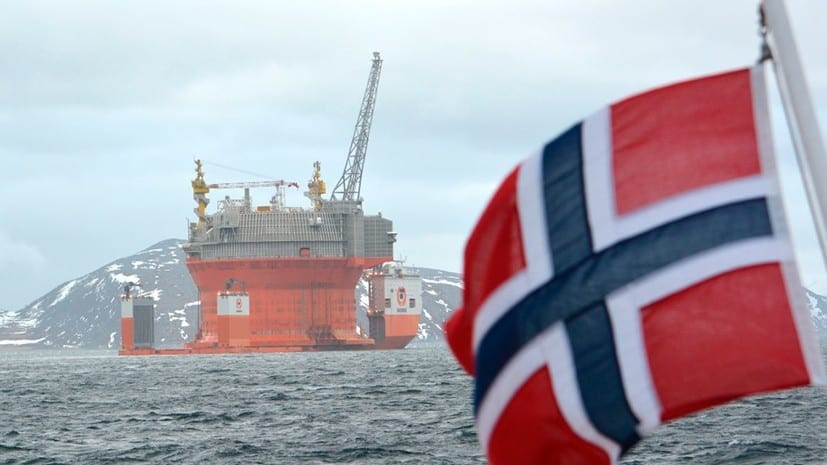In the world of the mid-20th century, the dream of every middle or low income country was the discovery of crude oil reserves. At a time with stable prices and a high global demand, oil brought with it the promise of limitless wealth and a prosperous future, a fix to all financial issues. However, as we look at the current state of the world’s hydrocarbon economies it is clear that oil has not benefitted all equally, and often creates more problems than it solves. So why is this the case, and how can countries utilise their oil wealth to have the greatest impact on their population?

To find out, we can compare two countries who both supply approximately 2% of global crude oil, Nigeria and Norway. Situated at the confluence of the Niger and Benue rivers, Nigeria is a largely rural country whose main exports were agricultural prior to the discovery of crude oil, growing cocoa, palm oil, and groundnuts for global markets. Under British colonial control, there was little effort to diversify and industrialise the economy, catering instead for the growth of private corporations. It was during this period, in 1956, when British companies Shell and BP found crude oil. When Nigeria gained its independence four years later, Shell and BP did not leave, with private companies still extracting 70-80% of its oil to this day. These companies work with the Nigerian National Petroleum Corporation (NNPC), a body that manages and taxes their profits before sending them to the national treasury. However, as the NNPC regulator is a part of the NNPC itself, there is an obvious lack of transparency, which has led to tens of billions of dollars seemingly ‘vanishing’, and private companies avoiding taxes. Hence despite having Africa’s largest population and 4th largest economy, over a third of Nigerians live in extreme poverty, placing Nigeria at 161st in the Human Development Index (HDI) rankings. With over 90% of export earnings and 50% of government income reliant on oil, there are incentives to pass a petroleum industries bill to tighten current regulations, and to build more refineries within Nigeria to increase the value of oil exports.

At the other end of the spectrum we have Norway, a mountainous and sparsely populated country in Scandinavia. Throughout its history it has exported fish (notably whale) and timber to the rest of Europe, continuing to do so after becoming an independent nation in 1905. For 60 years it maintained a slow pace of economic growth compared to the rest of Europe, before discovering oil offshore. Within 3 years the Norwegian government had established a state-owned oil company Statoil (now Equinor), to whom it could award exclusive drilling and refining rights. At the same time, it also created a sovereign wealth fund (Government Pension Fund Norway/Global) in which to invest all profits from the oil extraction. Fast forward another 60 years, and this fund is now the largest of its kind in the world (an estimated $1.7 trillion), with enough to pay for the living costs of every Norwegian for 7 years. By viewing oil as a means to an end, rather than an end in itself, Norway has been able to use responsible amounts of its wealth to support its own growth and economic diversification, whilst saving enough to safeguard its future, independent of the oil market. As a result, it is one of the richest and happiest countries in the world, ranking 2nd on the HDI.

Whilst both countries discovered similar amounts of oil at a time in which neither was already wealthy, there are a number of key differences:
- Since the discovery of oil the population of Nigeria (230 million) has almost quintupled, whilst Norway’s population (5.5 million) has not even doubled. This divides a similar economic resource between vastly different population sizes, with implications on the effectiveness with which wealth can be distributed.
- When looking at the location of oil fields in both countries, in contrast to Norway’s offshore fields, Nigeria has a large proportion situated in the Niger Delta near to densely populated rural and urban areas. Due to the frequent oil spills and fumes from legal (and illegal ‘bunkering’) refineries, the water and air pollution has resulted in one of the world’s worst ecological disasters. Despite years of promised action, little national or international action has been taken, making it easier to continue to over-exploit the area.
- The largest difference is the control each country has over its own resources, and the efforts they are making to diversify their economies. Whilst Norway was able to quickly nationalise its oil industry and set up a rigorous legal framework to ensure proper management, Nigeria has struggled to retain control of its own resources. Given the strong presence of foreign interests, and the unreliability of institutions remaining from the colonial period and multiple military dictatorships, the government is lacking a framework to control or remove systems that don’t benefit its people or economy. Therefore, it has become reliant on private companies, and oil, to support itself.

These patterns can be seen in most other hydrocarbon economies, in which an over-reliance on the current system, regardless of its adverse effects, is embedded into way the country functions. Even in Norway, the economy is not nearly diversified enough to leave behind oil production, or even scale it back. Therefore, in order to win from your oil wealth, extraction and refinery must be controlled by the state, and not private companies, ensuring that profits are saved and re-invested into growing all other sectors of the economy until they are lucrative enough to fully support a high quality of life for all without further need for oil.
Sources
https://eh.net/encyclopedia/the-economic-history-of-norway/
https://www.norskpetroleum.no/en/framework/norways-petroleum-history/
https://www.ft.com/content/a9850445-50be-41e3-95f9-0238d7a0218b
https://www.amnesty.org/en/latest/news/2018/03/niger-delta-oil-spills-decoders/
https://www.nobelprize.org/prizes/economic-sciences/2024/press-release/
https://hdr.undp.org/data-center/country-insights#/ranks
https://etonomics.com/2023/04/28/nigerias-reliance-on-oil/
Images
https://oilnow.gy/featured/norway-awards-47-new-oil-and-gas-exploration-licences/
https://www.ft.com/content/754a5d72-fa78-11e2-a7aa-00144feabdc0
https://www.sodir.no/en/whats-new/publications/Maps-of-the-ncs/
https://www.energy-cg.com/OPEC/Nigeria/OPEC_Nigeria_EIA.html